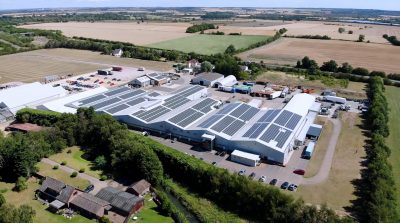Hagg Farm
Tucked away in the heart of the Peak District, Hagg farm offers outdoor education and personal skill development for residential, schools and group visits.
SCROLL

K e y S t a t s
CO2 saved per year
14,217kg CO2 saved per year
Annual Output
26,876 kWh
Inverter Model
Kaco
Panel Model
Phono Solar 250W
System Size
32 kWp
The Challenge
We were approached by Nottingham County Council for help to overcome a power export limit at Hagg Farm, an outdoor education centre for young people in the Peak District. Due to its location in rural Derbyshire, the site is powered only by overhead lines, which meant that the team at Hagg Farm was told the array must stay below an export limit of 7kWp, to reduce the strain on the National Grid by the Distribution Network Operator (DNO). However, this would have meant reducing its size by 75% which wouldn’t have made the project unfeasible. We needed to be innovative.
OUR SOLUTION
Our project management team had the idea of fitting an Export Power Control (XPC) system on site. This has helped the council to overcome one of the biggest barriers to the future integration of renewables systems into the existing power network. The EPC system is comprised of conventional controls used in industrial automation. It can be implemented on virtually any size of solar array alongside inverters from a variety of leading manufacturers. The XPC ensures that the export power never exceeds 7kW for more than a few seconds; an inventive answer to what is becoming a common requirement of the electricity network operators.
An EPC, however, allows firms to still install large solar arrays by reassuring DNOs that the level of exported power is controlled and the electricity network will not be put at risk. This way the business can still benefit from the significant offset of imported energy costs during the daytime.
THE RESULT
The install was completed in less than two weeks and involved a team of five engineers working on fragile slate roofs; some more than a century old. By using the SolarFlash™ system for slate roofs, the integrity of the roofs could be maintained to comply with the Microgeneration Certification Scheme. With the EPC system now in place, the centre will now benefit from up to 25,000 kWh of self-generated energy per year, equivalent to a 13-tonne annual saving in CO2 emissions.
The PV at Hagg Farm are part of the Nottingham County Council’s £1.8million investment programme in solar panels, which is itself part of a wider programme of investment in renewable energy and energy efficiency across its estate.

